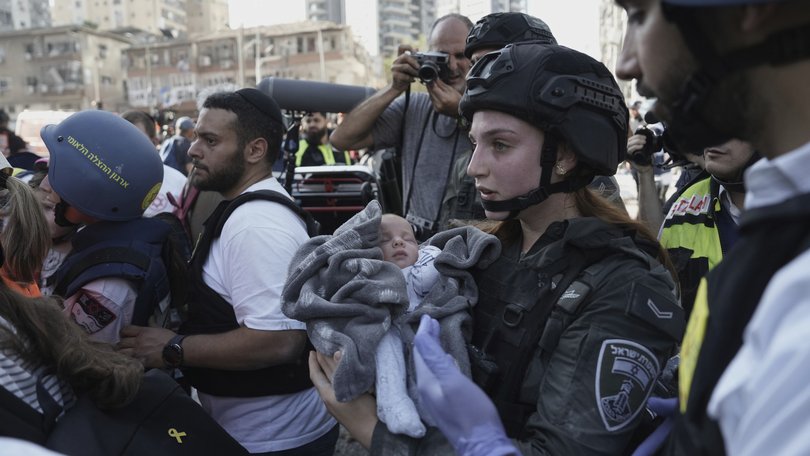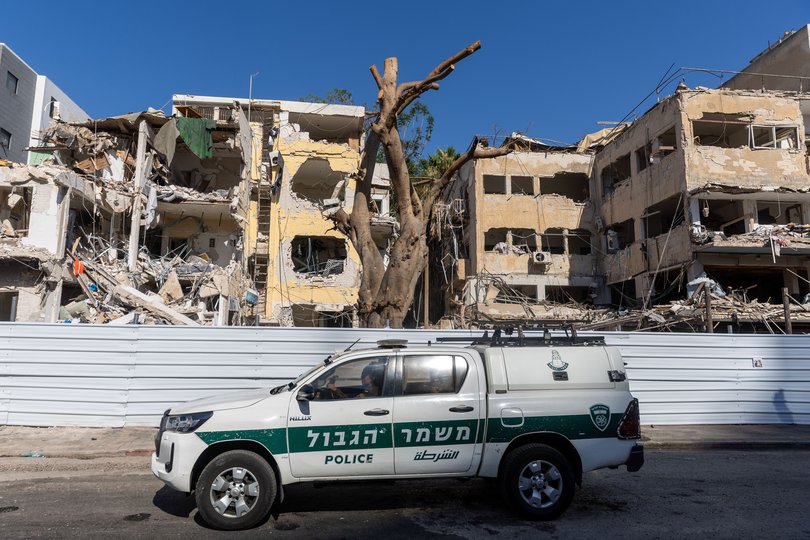Iran Israel war: Tehran rockets hit Be’er-Sheva hospital as conflict continues to ramp up
An Israeli hospital has been damaged and an Iranian heavy water reactor hit as the escalating Middle East crisis enters the seventh day with Donald Trump still weighing up US involvement.

An Israeli hospital has been damaged and an Iranian heavy water reactor hit as the escalating Middle East crisis enters the seventh day and Donald Trump considers whether to get the United States’ involved.
On Thursday morning, local time, Iran launched dozens of ballistic missiles at several civilian population centres, including in Tel Aviv and in the southern city of Be’er-Sheva, injuring dozens of people.
Iran said the “main target” of its missile attack was the large Israeli army “Command and Intelligence headquarters and the military intelligence camp” located next to the Soroka Hospital, according to state media, but Israel says the 1000-bed facility was extensively damaged.
Sign up to The Nightly's newsletters.
Get the first look at the digital newspaper, curated daily stories and breaking headlines delivered to your inbox.
By continuing you agree to our Terms and Privacy Policy.Israeli President Isaac Herzog said the strikes had deliberately targeted civilians, while Health Minister Uriel Buso said a “red line” had been crossed and labelled the attack a “war crime”.
Prime Minister Benjamin Netenyahu said: “We will exact the full price from the tyrants in Tehran”.
Defense minister Israel Katz said he and Mr Netanyahu had ordered the Israeli military to increase “the intensity of the attacks on strategic targets in Iran and against government targets in Tehran in order to remove threats to the State of Israel and undermine the Ayatollahs’ regime”.
Iran’s latest attacks came as a state-sanctioned internet blackout continues. Israel had earlier attacked the Arak heavy water reactor after earlier ordering those in nearby villages to flee before it targeted Iranian “military infrastructure”.
Israel has also claimed credit for attacking a nuclear weapons development site near Natanz, close to Iran’s main nuclear enrichment facility struck in the first wave on Friday, and numerous factories that manufacture ballistic missile components.
Iranian state TV said there was “no radiation danger whatsoever” from the Arak attack.
The latest tit-for-tat came hours after the United States President refused to rule in or rule out striking Iran’s nuclear facilities.
He said he was still hopeful a “deal could still happen” but that he believed Iran was “a few weeks away from having a nuclear weapon”.
He said the next few days would be “very big”, and when asked what his demand for “unconditional surrender” meant, said he has “had it” with Iran.
“I may do it. I may not do it,” he said to questions of deploying military assets.
“I mean, nobody knows what I’m going to do. I can tell you this, that Iran’s got a lot of trouble, and they want to negotiate.”
Later in the day, as he posed for photographs in the Oval Office, the President once again signalled he had not made up his mind — and was unlikely to do so until the last possible moment.
“ I have ideas as to what to do, but I haven’t made a final (call),” Mr Trump said.
“I like to make a final decision one second before it’s due, you know? Because things change, especially with war. Things change with war. It can go from one extreme to the other.”
Before the latest comments from the President, Iran’s Ayatollah Ali Khamenei had warned the US against getting involved, saying any such intervention “will undoubtedly be accompanied by irreparable damage” and attacks on American assets in the region.
Mr Trump will meet again with senior military and intelligence advisers in the White House situation room on Wednesday morning, Washington time.
The Wall Street Journal has reported, citing sources, that President Trump had privately approved attack plans for Iran, but has withheld the final order. A few hours later, Bloomberg reported senior US officials were preparing for a possible strike on Iran in the coming days, potentially as soon as this weekend..
With the world waiting to see what Mr Trump does, back in Australia questions have turned to what role Australia might play if the US was to get directly involved.

Foreign Minister Penny Wong sidestepped questions on Thursday morning, saying only that Australia was “not a central player in the Middle East”.
When asked if Australia was moving defence assets to the region, as the US has done, she said the same thing.
Senator Wong’s language has hardened in the last two days, moving beyond calls for everyone to come back to the table to directly calling on Tehran to work with the international community for a peaceful outcome.
“Our message to Iran, along with so many countries of the world, is it’s time to stop any nuclear program and it’s time to come to the table,” she said.
“Iran must return to the table and it must stop any production of nuclear weapons.”
On Thursday afternoon, Deputy Prime Minister and Defence Minister Richard Marles said Australia respected that Israel had a right to defend itself, but was equivocal when asked if he believed Israel’s actions in the last week had been defensive.
He said Australia wants to see the conflict “de-escalted”.
“What we want is to see a de-escalation – not to see this conflict grow but to see it de-escalated, and a pathway to diplomacy and dialogue,” he told ABC News.
“ It is precisely because of the risk of escalation and the consequences that would flow from that we are exercising our voice that way.
“By doing that we are joining many other countries around the world doing the same.”
European leaders meanwhile are still hoping the crisis can be resolved through diplomacy, with British, German and French foreign ministers set to meet with their Iranian counterpart in Geneva on Friday.
The talks will focus on whether Iran is willing to reduce or close its nuclear program. American officials have told Associated Press there were no plans for US involvement at this stage.

